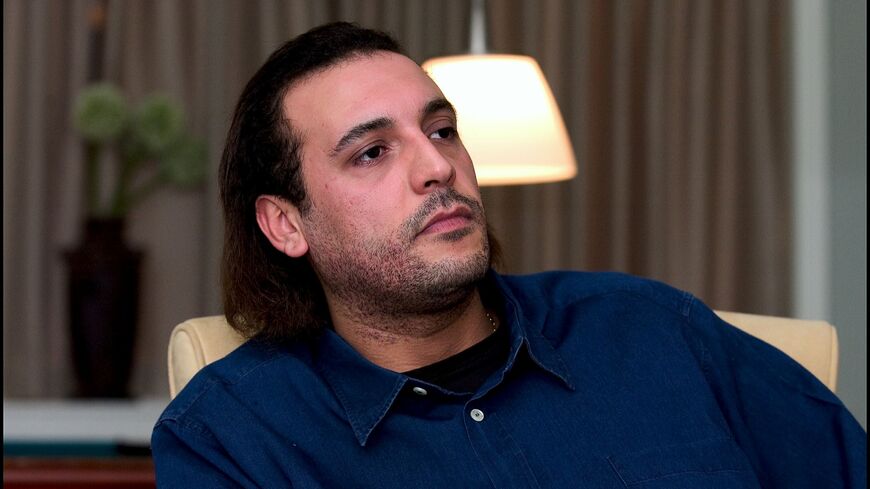BEIRUT — The health of Hannibal Gadhafi, son of the late Libyan leader Moammar Gadhafi, was deteriorating three days after he began a hunger strike to protest his prolonged detention without trial in Lebanon.
Gadhafi was suffering from headaches and muscle pain, his lawyer, Paul Romanos, told The Associated Press. He was also feeling back pain in his small cell.
Gadhafi, 47, began a hunger strike on Saturday to protest his “arbitrary and political detention” over his alleged involvement in the disappearance of Lebanese Shiite cleric Musa al-Sadr in the late 1970s.
In a statement, Gadhafi called for his immediate release after being detained for years for a crime he said he did not commit. “How can a political prisoner be held without a fair trial all these years?” he added.
In December 2015, the Lebanese judiciary arrested Gadhafi on charges of withholding information on the disappearance of Sadr and two of his companions — Sheikh Muhammad Yaacoub and journalist Abbas Badreddine — in Libya in 1978. Reports at the time claimed that Gadhafi was lured from Syria, where he had been living as a political refugee since the fall of his father’s regime in Libya in 2011. In an interview with the Saudi channel Al-Hadath last September, Gadhafi said he was taken by the Lebanese Yaacoub family to demand information on the disappearance of their relative and Sadr.
Gadhafi insists that he does not have any information on the disappearance of the three men. The Libyan man was only a toddler when Sadr, the founder of the Lebanese Shiite Amal Movement, went missing in the Libyan capital Tripoli. Supporters of Sadr believe he is still alive in a Libyan prison. Others claim Moammar Gadhafi ordered his killing. Libyan authorities have denied the claim, saying Sadr and his companions had left Libya for Rome. Italy denies that Sadr entered its territories.
Since Gadhafi’s arrest in 2015, his supporters have repeatedly called for his release. In a statement last year, the Gadhafi family condemned the conditions in which their son was held and urged Lebanese authorities to immediately release him.
The new developments in Gadhafi’s case coincide with a report about worsening conditions in Lebanese prisons and deaths in custody.
In a report released on Wednesday, Amnesty International blamed the Lebanese authorities’ neglect and lack of medical care for the rising number of deaths in Lebanon’s prisons since the country’s economic crisis in 2019.
According to figures by the Ministry of Interior, which Amnesty reviewed, the number of deaths in prisons nearly doubled within four years, with 34 deaths registered in 2022 compared to 18 in 2018.
Aya Majzoub, Amnesty International’s deputy director for the Middle East and North Africa, said in the report, “The sharp increase in custodial deaths must be a wake-up call to the Lebanese government that their prisons need urgent and drastic reform.”
Lebanese authorities have blamed the economic crisis that has engulfed the country since October 2019 for the deteriorating conditions in prisons. The Ministry of Interior’s prison budget has decreased from $7.3 million in 2019 to around $628,000 in 2022 due to the collapse of the local currency.
“The economic crisis is no excuse for prison authorities to deny prisoners access to medication, shift the cost of paying for hospitalization to the families of prisoners or delay prisoners’ transfers to hospitals,” Majzoub added in the report.
Amnesty interviewed 16 people, including prisoners and relatives of people who died in custody. Most of them said prison authorities have ignored requests by prisoners for health care or medication.
In August 2022, Khalil Taleb, 34, died in Roumieh, Lebanon’s main prison east of the capital Beirut, after the prison pharmacist refused to administer medication.
In addition, Amnesty says Lebanese prisons are 323% over capacity. “The authorities should also investigate to what extent the sharp increase in deaths is linked to structural factors such as overcrowding, lack of adequate resources and impunity for ill-treatment, all exacerbated by the economic crisis,” the UK-based rights organization said.
In May, two prisoners also died in Roumieh in less than two days. The Internal Security Forces (police) said a 16-year-old prisoner was found hanged in his cell. Another 32-year-old Palestinian died from cardiac arrest, according to police.
Roumieh houses nearly 4,000 prisoners, three times its intended capacity, according to the Prison Insider website. In November 2021, prisoners in Roumieh staged protests against harsh conditions.







